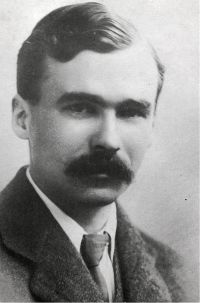Butterworth, The Lads in Their Hundreds
 George Butterworth (1885-1916) was one of several the English composers who in the early 20th century collected folk songs and worked them into his compositions. We have already looked at his contemporaries Ralph Vaughan Williams, Gustav Holst, Frank Bridge, and Percy Grainger.
George Butterworth (1885-1916) was one of several the English composers who in the early 20th century collected folk songs and worked them into his compositions. We have already looked at his contemporaries Ralph Vaughan Williams, Gustav Holst, Frank Bridge, and Percy Grainger.
Butterworth studied at Eton College and attended Trinity College, Oxford. He became involved there with musical and literary circles that were involved in the collection and preservation of English folk songs. Like other folk song collectors, he traveled across the English countryside recording and transcribing the songs. Vaughan Williams had a particularly strong influence on Butterworth after they became close friends in 1907.
Butterworth’s arrangements of traditional songs, like those of Vaughan Williams, brought that music into the concert and recital halls. In his Folk Songs from Sussex (1912), for example, he kept the folk melodies exactly as they had been sung to him, making a few necessary edits to the text and adding a piano accompaniment.
But he is best remembered for his original compositions setting the poetry of A. E. Houseman, in particular a collection of six songs from Houseman’s collection of 63 poems entitled A Shropshire Lad. The poems published in 1896 dealt with themes of soldiers going off to war and untimely death. After slow start they became highly popular during the Second Boer War (1899-1902). Butterworth’s settings were written in 1911, and they retain the aura of English folk songs.
“The Lads in Their Hundreds” is the 23rd poem in Houseman’s collection and No. 5 in Butterworth’s cycle. With a cheerful tune describing young men coming to the fair, the poet wonders which of them will go off to war and never return. Butterworth would be one of those men, dying in the Battle of the Somme in 1916.



